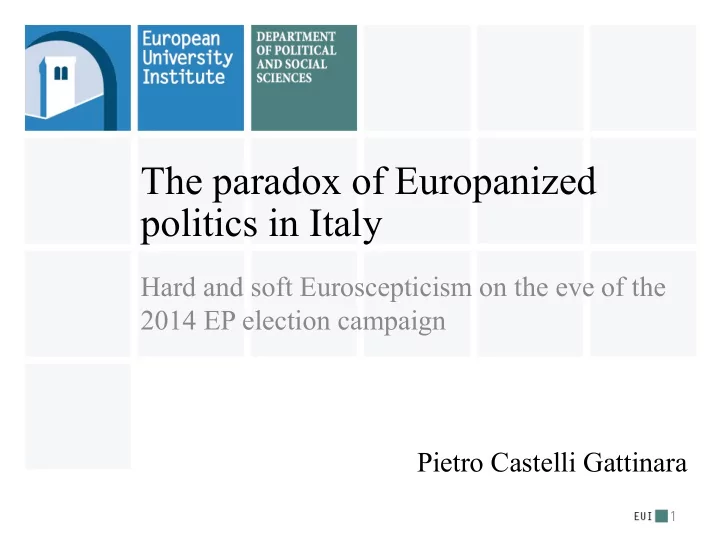

The paradox of Europanized politics in Italy Hard and soft Euroscepticism on the eve of the 2014 EP election campaign Pietro Castelli Gattinara 1
Italy and the EU: From popular dissatisfaction… 2
Italy and the EU: …to populist Euroscepticism “More Italy in Europe Less Europe in Italy” “Italians come first!” “Out of the EU: National Sovereignty” 3
The Europeanization of the Italian political system The two dimensions of Europeanized politics in Italy 1.The EU as an increasingly salient political issue – National and EU policy agendas become de facto inseparable and undistinguishable – EP affiliations and Europarty leaderships increasingly matter in determining party choices in national arenas 2.The EU as a non-competitive issue for mainstream parties – Delegation of decision-making to EU-level – Scapegoating and de-responsibilization – Left-Right convergence, consensus and technocracy – Reduction of the stakes of political competition and opposition 4
Depoliticized Europeanization • National institutional configurations resemble more and more the design of EU institutions: – Partisan convergence and hyper-consensus decision making distort traditional representation and accountability. – Disappearance of the government-opposition nexus, and failure to organize opposition within the system. • The growing importance of opposition of principle: – Lacking incentives to organize opposition in the EU polity, parties seeking to capitalize on EU-discontent mobilize opposition to the EU polity. • In Italy, this should have resulted in a shift from “soft” to “hard” Euroscepticism 5
Soft and Hard Euroscepticism (Szczerbiak and Taggart 2008) Soft Euroscepticism Hard Euroscepticism • “a sense that ‘national • “a principled opposition to the interest’ is currently at odds EU and European Integration” with the EU trajectory” • Typical of parties claiming • Qualified opposition to membership withdrawal integration • Support for policies • Opposition is not based on a equivalent to a complete pre-existing set of ideas (supra- opposition to the current nationalism, neoliberalism, project of EU integration. technocracy) 6
The mainstream right: From Forza Italia to Forza Italia • Berlusconi’s parties : – Very ambiguous position (rhetoric) vis-à-vis the EU. – Rarely matched by concrete policy actions in government. • 1994-2001: minimal attention and occasional issue conflicts. • 2001-2008: policy indifference with enhanced political tensions. • 2008-2014: increasing critique of EU institutions and policies • The crisis, technocratic government and the first austerity measures boosted the process and the radicalization of the discourse • Yet, combining a silent practice of responsibility in parliament with a loud rhetoric of contestation outside institutions 7
Forza Italia ’s contingent Euroscepticism 1. The foreign takeover rhetoric “the problem is not the Euro: we have to renegotiate the treaties signed on bended knee in front of Germany” 2. Increasingly anti-Euro “Enough with the Euro, foreign currency!” 3. Anti-Germany frames “More Italy, Less Germany!” • Euroscepticism is a frequent habit, yet associated to convenient circumstances rather than inborn to ideology 8
The regionalist populism of Lega Nord • Until late 1990s substantially pro-European: – the EU arena provided opportunities for regionalism • After 1998: “Janus face” on EU integration – Eurosceptic discourse under favourable conditions, but generally open to compromise when EU salience is low • 2012-2014: growing opposition to the Euro – Demands for territorial and monetary sovereignty • “Dismantling Brussels” campaigns – Independence from the national power of Rome would not be sufficient without independence from Brussels. 9
Lega ’s Euroscepticism and the 2014 campaign • “Another Europe is possible” – “Enough with Euro” • Differentiation within the party system – “Lega: the only – “PD: Europe means obeying” opposition to Euro-delyrium! 1 0
National grievances, EU issues: Movimento 5 Stelle • EP elections are a “crusade” towards a better Europe – Critique of EU institutions and democratic deficit (EP) • Main frame is socioeconomic utilitarianism – radical rejection of technocracy and economic austerity • The M5S does not address a European audience – Italian electorate – Italy’s economic problems and quality of democracy – malfunctioning of Italy’s representation within the EU • The critique of the democratic deficit is a supra-national transposition of the critique to the Italian system. 1 1
The electoral campaign of M5S • “in Europe, for Italy, with M5S” – Criminal record of candidates • National frame of reference – “Common men vs. politicians 1 2
The extra-parliamentary radical right arena • Street movements and extreme-right organizations – Forza Nuova, CasaPound, Pitchfork movement • Hard Euroscepticism on utilitarian reasoning – Negative economic consequences of austerity/technocracy • challenges to national sovereignty, identity, and prosperity – Worsening living conditions due to EU integration • Europeanized discourse – Identitarian call for European solidarity among people sharing common religious and cultural roots 1 3
Against austerity for a “pan-European Empire” • “Out of the Euro!” – Monetary sovereignty against Euro-dictatorship • “ Enough with the EU!” – Europeans, not slaves • “ Italians come first” 1 4
Conclusions • A political agenda in which it is impossible to separate out what is European and what is domestic • The elections (EP and National) determine government but not the direction of economic governance – the degree of disenchantment with the EU has grown – Radicalized Euroscepticism has grown: • opposition to EU equivalent to opposing the whole process of integration • Yet, Euroscepticism remains contingent rather than ideological – Politicization of the EU is not sufficient if politics are perceived as a technocratic exercise lacking political alternatives – Need to restore accountability and responsiveness – Europeanize party systems or politicize the EU arena? 1 5
Recommend
More recommend